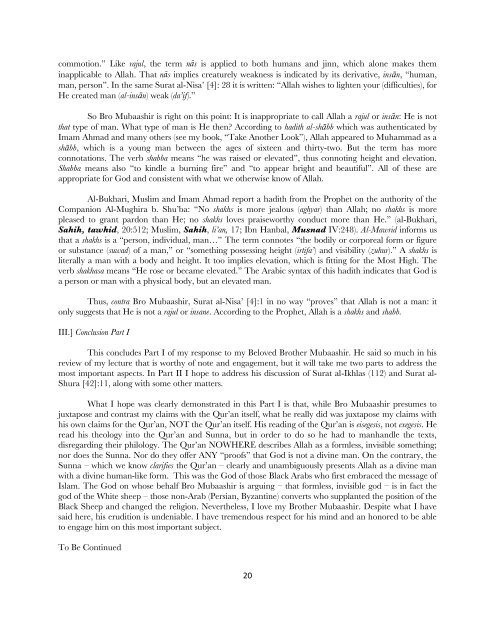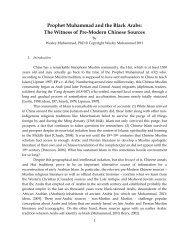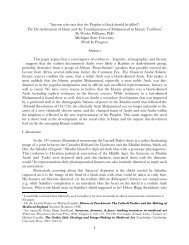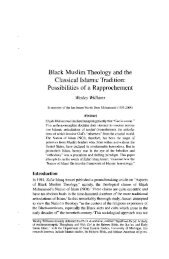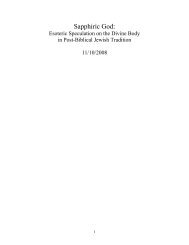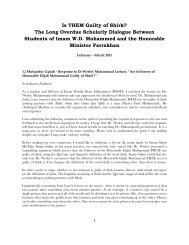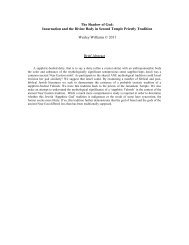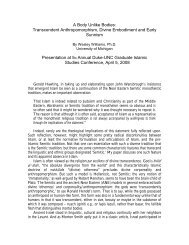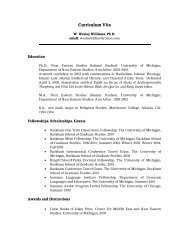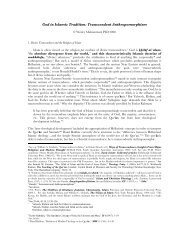Is THEM Guilty of Shirk? - Dr. Wesley Muhammad
Is THEM Guilty of Shirk? - Dr. Wesley Muhammad
Is THEM Guilty of Shirk? - Dr. Wesley Muhammad
Create successful ePaper yourself
Turn your PDF publications into a flip-book with our unique Google optimized e-Paper software.
commotion.‖ Like rajul, the term nās is applied to both humans and jinn, which alone makes them<br />
inapplicable to Allah. That nās implies creaturely weakness is indicated by its derivative, insān, ―human,<br />
man, person‖. In the same Surat al-Nisa‘ [4]: 28 it is written: ―Allah wishes to lighten your (difficulties), for<br />
He created man (al-insān) weak (da‟if).‖<br />
So Bro Mubaashir is right on this point: It is inappropriate to call Allah a rajul or insān: He is not<br />
that type <strong>of</strong> man. What type <strong>of</strong> man is He then? According to hadith al-shābb which was authenticated by<br />
Imam Ahmad and many others (see my book, ―Take Another Look‖), Allah appeared to <strong>Muhammad</strong> as a<br />
shābb, which is a young man between the ages <strong>of</strong> sixteen and thirty-two. But the term has more<br />
connotations. The verb shabba means ―he was raised or elevated‖, thus connoting height and elevation.<br />
Shabba means also ―to kindle a burning fire‖ and ―to appear bright and beautiful‖. All <strong>of</strong> these are<br />
appropriate for God and consistent with what we otherwise know <strong>of</strong> Allah.<br />
Al-Bukhari, Muslim and Imam Ahmad report a hadith from the Prophet on the authority <strong>of</strong> the<br />
Companion Al-Mughira b. Shu‘ba: ―No shakhs is more jealous (aghyar) than Allah; no shakhs is more<br />
pleased to grant pardon than He; no shakhs loves praiseworthy conduct more than He.‖ (al-Bukhari,<br />
Sahih, tawhid, 20:512; Muslim, Sahih, li‟an, 17; Ibn Hanbal, Musnad IV:248). Al-Mawrid informs us<br />
that a shakhs is a ―person, individual, man…‖ The term connotes ―the bodily or corporeal form or figure<br />
or substance (suwad) <strong>of</strong> a man,‖ or ―something possessing height (irtifa‟) and visibility (zuhur).‖ A shakhs is<br />
literally a man with a body and height. It too implies elevation, which is fitting for the Most High. The<br />
verb shakhasa means ―He rose or became elevated.‖ The Arabic syntax <strong>of</strong> this hadith indicates that God is<br />
a person or man with a physical body, but an elevated man.<br />
Thus, contra Bro Mubaashir, Surat al-Nisa‘ [4]:1 in no way ―proves‖ that Allah is not a man: it<br />
only suggests that He is not a rajul or insane. According to the Prophet, Allah is a shakhs and shabb.<br />
III.] Conclusion Part I<br />
This concludes Part I <strong>of</strong> my response to my Beloved Brother Mubaashir. He said so much in his<br />
review <strong>of</strong> my lecture that is worthy <strong>of</strong> note and engagement, but it will take me two parts to address the<br />
most important aspects. In Part II I hope to address his discussion <strong>of</strong> Surat al-Ikhlas (112) and Surat al-<br />
Shura [42]:11, along with some other matters.<br />
What I hope was clearly demonstrated in this Part I is that, while Bro Mubaashir presumes to<br />
juxtapose and contrast my claims with the Qur‘an itself, what he really did was juxtapose my claims with<br />
his own claims for the Qur‘an, NOT the Qur‘an itself. His reading <strong>of</strong> the Qur‘an is eisegesis, not exegesis. He<br />
read his theology into the Qur‘an and Sunna, but in order to do so he had to manhandle the texts,<br />
disregarding their philology. The Qur‘an NOWHERE describes Allah as a formless, invisible something;<br />
nor does the Sunna. Nor do they <strong>of</strong>fer ANY ―pro<strong>of</strong>s‖ that God is not a divine man. On the contrary, the<br />
Sunna – which we know clarifies the Qur‘an – clearly and unambiguously presents Allah as a divine man<br />
with a divine human-like form. This was the God <strong>of</strong> those Black Arabs who first embraced the message <strong>of</strong><br />
<strong>Is</strong>lam. The God on whose behalf Bro Mubaashir is arguing – that formless, invisible god – is in fact the<br />
god <strong>of</strong> the White sheep – those non-Arab (Persian, Byzantine) converts who supplanted the position <strong>of</strong> the<br />
Black Sheep and changed the religion. Nevertheless, I love my Brother Mubaashir. Despite what I have<br />
said here, his erudition is undeniable. I have tremendous respect for his mind and an honored to be able<br />
to engage him on this most important subject.<br />
To Be Continued<br />
20


